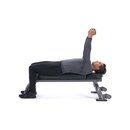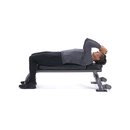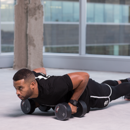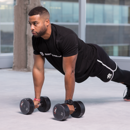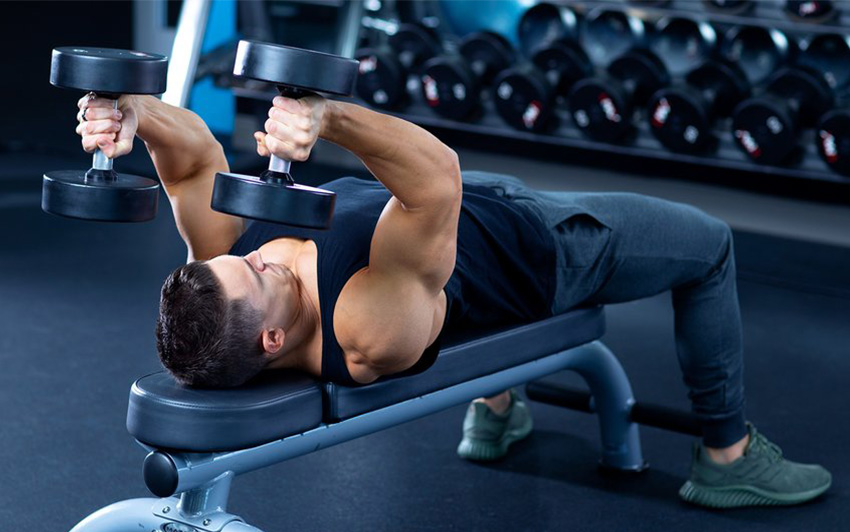

ტრიცებსის ვარჯიში
It's funny that flexing biceps has become the symbol for big arms because the biceps aren't actually the biggest muscle group in the upper arms. That honor belongs to the triceps. Training your triceps hard—and smart—are key to not only getting big arms but also getting stronger on pressing movements.
When it comes to triceps training, you can never go wrong with dumbbells. With dumbbells, you can work the muscles in a variety of ways. Going with lighter weight lets you work one arm at a time. Going heavier enables you to use both arms at the same time, similar to what you would do with a barbell.
This four-move workout can help make your triceps bigger, stronger, and more completely developed. It's a good idea to group it with another pushing muscle like chest or shoulders in your training schedule. You can also do it with your biceps workout to have a complete and intense arm day.
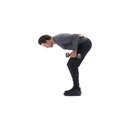
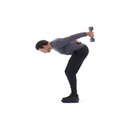
Technique Tips
Single-Arm Dumbbell Kick-Back
The workout starts here for two reasons. First, you need to do these slowly so you can feel the triceps working. The mind-muscle connection will be important going forward in this session. Second, you're also warming up your elbows in a safe way because you'll be going heavier in future exercises and you want those joints to be prepared.
Start with whichever arm you feel needs the most improvement. If you have trouble feeling your triceps working on your left arm, start with that one. Perform the reps with a constant cadence. Keep that upper arm locked into your side so you don't swing. Contractions and control are what matter.
Double-Arm Overhead Extension
This is your main movement of the day and it will blast all three heads very effectively. You can do these while sitting on a bench or standing—whichever feels most comfortable. If you choose to stand, make sure you don't generate momentum with your legs. Lower the weight behind your head as far as you can safely, but don't push it to the point of risking injury. If you feel a stretch, you're good to press.
When you press up, don't completely lock out your triceps. Flex them hard and stop just short of shifting the pressure to the elbows. Your last set is a dropset, so as soon as you complete the last rep, rack that dumbbell and grab one that is light enough for you to do around 8-10 more reps.
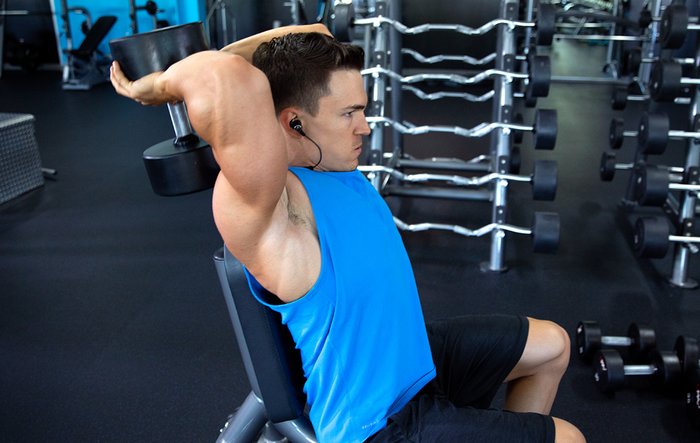
Lying Triceps Extension
This is the dumbbell version of the classic skullcrusher. The advantage of doing it with dumbbells rather than a barbell is that you can lower the weights farther behind your head to get a deeper stretch. Your arms can also move more naturally as they're not connected by a bar, and each arm has to do its own work.
If you want to add another advanced trick, try twisting the dumbbells slightly at the bottom and turning them back when you press up. That will help bring out the horseshoe look on the back of the arm.
Dumbbell Push-Up
Push-ups are great for the triceps as well as the chest and shoulders. When you set up for this, position the dumbbells so you can hold your elbows against your sides as much as possible. That will keep the focus on the triceps, similar to the way a close-grip bench press does.
Lower yourself as close as you can to the weights. Pause at the bottom for a count of one before pushing up. When you reach the top of the rep, squeeze those triceps as hard as you can for a count of two. Repeat this cadence for the rest of the set. When you complete the last rep, hold yourself at the top for a count of 10, which will set your triceps on fire but also help with density and endurance.



